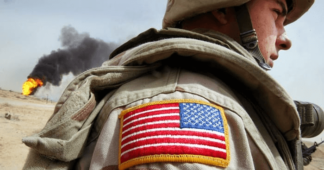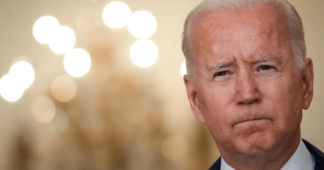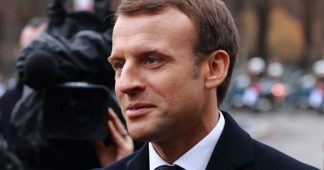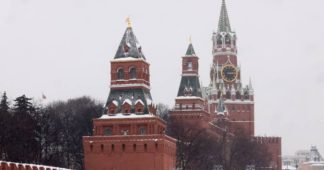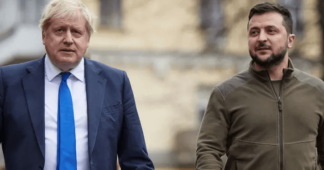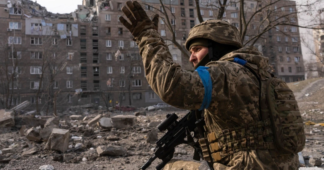Posted on
Five statements made over a period of a few days by high level government officials received very little media attention. When combined, though, they produce a pattern that could make headlines.
On December 1, French President Emmanuel Macron held talks with President Biden. Camouflaged by a joint statement that expressed solidarity with the US position on the war in Ukraine, Macron told the French media what he hadn’t told the US media: though, perhaps, he had privately told Biden.
Macron said that “We need to prepare what we are ready to do, how we protect our allies and member states, and how to give guarantees to Russia the day it returns to the negotiating table. One of the essential points we must address – as President Putin has always said – is the fear that NATO comes right up to its doors, and the deployment of weapons that could threaten Russia.”
Macron’s statement agreed with Putin that NATO expansion to Russia’s doors is an essential point that must be addressed by security guarantees to Russia, as Putin had requested as recently as the eve of the invasion. The French leader was proposing negotiations that are prepared to include discussion of Russia’s security concerns about NATO expansion, Ukraine joining NATO, and NATO weapons in Ukraine and elsewhere near Russia’s borders.
That is a significant break from the public US position that NATO is a defensive alliance that poses no threat to Russia, that Ukraine has a right to choose its own alliances, that Russia has no veto over NATO membership and that Ukraine’s request for membership never be on the negotiation table with Russia. It reflects a willingness to discuss one of the core demands Putin made when he requested negotiations on mutual security guarantees in December 2021 before the war.
Since his election in 2017, Macron has advanced the position that, contrary to US insistence, an ostracized and threatened Russia is not in the interest of Europe. Perhaps more than any other Western leader, Macron has kept a line of communication open with Putin since the war began. Along with Germany, France has never been as certain as the US that NATO expansion into Russia’s neighborhood is in the security interest of their countries, nor that expansion into Russia’s neighborhood wouldn’t be perceived as a security threat by Russia. It was Germany and France in 2008 who opposed the US plan for Ukrainian and Georgian accession to NATO.
And it is Germany who contributed the second statement to the pattern that could change negotiations on the war.
Like Macron, German Chancellor Olaf Scholz provided his own camouflage for his paradigm changing statement. In an article in Foreign Affairs, Scholz offered up a harsh critique of Putin and his war. Aside from his recognition of a new multipolar world, his piece fit the US paradigm.
But a piece he penned on December 1, the same day Macron was in Washington, was very different. Like Macron’s camouflaged statement, Scholz’ seems to have received little attention.
After criticizing Russia for “destroying the peace order we worked on for so many decades,” the German chancellor made a startling addition. He said there was a “willingness” to engage with Putin on issues of arms control and missile deployment. He said that “We have to go back to the agreements which we had in the last decades and which were the basis for peace and security order in Europe.” And then he said that “all questions of common security could be solved and discussed. There is a willingness to do so.”
Like Macron, Scholtz is suggesting that negotiations to end the war should include negotiations on a European security architecture that addresses Russia’s security concerns. The pattern is forming.
And the pattern may extend beyond the US’s two most important European NATO partners. There have been changes to the message coming out of the other major player across the Atlantic.
On October 23, British Defense Secretary Ben Wallace expressed a “desire to de-escalate this conflict.” Surprisingly, and perhaps for the first time for a British official, he added that “the UK stands ready to assist” if “Ukraine and Russia seek a resolution to the war.” That offer is a significant shift from Boris Johnson’s reprimand of Ukrainian President Volodymyr Zelensky that Putin “should be pressured, not negotiated with” and that, “even if Ukraine was ready to sign some agreements with Russia, the West was not.”
And it is not just the current government in the UK that is shifting. Former Prime Minister Boris Johnson has enjoyed a close relationship with Zelensky, so his words may be weighty. In a December 9 opinion piece in the Wall Street Journal, Johnson continues to support Zelensky’s line that there can be “no land-for-peace deal.” But, subtly, without comment Johnson redefined the land that could not be traded by Ukraine for peace. “Russian forces,” Johnson insisted, “must be pushed back to the de facto boundary of Feb. 24.”
Contrary to the US mantra of nothing about Ukraine without Ukraine, and Zelensky’s insistence that Crimea and the entire Donbas be reincorporated into Ukraine, Johnson says that Russia must return to where it was before the day of the invasion. But that means that Russia would keep Crimea and large parts of the Donbas.
That is a big change from Johnson’s insistence that the West was not ready to negotiate with Russia. It is a big change from his opinion piece in the Wall Street Journal a month earlier in which he said that for Ukraine to give up land would be “disgusting” and “a moral reproach to humanity.”
Keeping those eastern ethnic Russian regions, coupled with a willingness to negotiate a European security structure that takes seriously Russia’s security concerns, starts to sound like a new opening in the West to engage diplomatically in a real conversation with Russia.
And Johnson is not a lone voice. On December 7, in the same nine day period that Macron, Scholtz and Johnson made their statements, Secretary of State Blinken made the same startling statement. For the first time, Blinken modified the US demand for territorial integrity, defining it, not as all of Ukraine, including Crimea and the Donbas, but Ukraine as it stood on the eve of the invasion. Blinken told the Wall Street Journal that the American goals in Ukraine are unchanged: “Our focus is on continuing to do what we’ve been doing, which is to make sure that Ukraine has in its hands what it needs to defend itself, what it needs to push back against the Russian aggression.” But then, shockingly and little noticed, he added that the goal was “to take back territory that’s been seized from it since February 24th.”
Blinken and Johnson had slipped in the same line. The goal was no longer to push Russia out of all of Ukraine but to push it back into the parts it was in before the invasion. And that implies the possibility of a negotiated settlement that leaves the ethnic Russian regions of Crimea and parts of the Donbas in Russia.
That was the first time a US official had redefined the diplomatic goal in public. But it had been foreshadowed by the fifth statement, one that had been made in private.
In mid November, it was reported that “Two European diplomats briefed on the discussions said [National Security Adviser] Sullivan recommended that Mr. Zelensky’s team start thinking about its realistic demands and priorities for negotiations, including a reconsideration of its stated aim for Ukraine to regain Crimea, which was annexed in 2014.” That statement, too, contributes to a pattern of a new stance on diplomacy.
Other members of the Western alliance have echoed these statements. On December 13, it was reported that “Some Western officials said Tuesday that the status of Crimea and the Donbas should be up for negotiation in eventual talks between Moscow and Kyiv.” One Western official said that “The long-standing issues of Crimea and the status of the Donbas might be something which are spoken about thereafter.”
British officials expressed “the absolute minimum needed for Russia to demonstrate it is serious about negotiating” as their willingness to “withdraw to positions that it occupied on Feb. 23, before the reinvasion.”
Germany said they will support whatever red lines Ukraine draws but added that “they believe it is unrealistic to expect that Russian troops will be fully expelled from all the occupied territories.”
Other officials and former officials who do not speak for the US government have contributed to the pattern as well. Former Joint Chiefs of Staff chairman Admiral Mike Mullen has said that the US needs to “do everything we possibly can to try to get to the table to resolve this thing,” adding that it “really is up to . . . Tony Blinken and other diplomats to figure out a way to get both Zelensky and Putin to the table. . . .The sooner the better.” Current chairman of the Joint Chiefs of Staff Mark Milley says that will have to happen with a recognition that “The probability of a Ukrainian military victory – defined as kicking the Russians out of all of Ukraine to include what they claim as Crimea – the probability of that happening anytime soon is not high, militarily.”
Former Secretary of State Henry Kissinger has twice recommended Johnson’s and Blinken’s before February 24th formula. In May, he called for negotiations in which “the dividing line should be a return to the status quo ante,” meaning the state of affairs existing prior to the war. Again, that would leave Crimea in Russia and Russia controlling parts of the Donbas.
On December 17, Kissinger repeated that call, saying “the time is approaching to build on the strategic changes which have already been accomplished and to integrate them into a new structure towards achieving peace through negotiation.” The changes that have been accomplished include Russian control of Crimea and parts of the Donbas. Kissinger recommended “establishing a ceasefire line along the borders existing where the war started on 24 February. Russia would disgorge its conquests thence, but not the territory it occupied nearly a decade ago, including Crimea. That territory could be the subject of a negotiation after a ceasefire.”
The comments of Mullen, Milley, Kissinger and the unnamed European officials join the four statements made by Macron, Scholtz, Johnson and Blinken within a nine day period and the advice given Zelensky by Sullivan in a pattern that suggests the possibility of a break with Zelensky’s preconditions for negotiations. The pattern that emerges suggests a new openness to the possibility of negotiations that include discussions of both the status of Crimea and the Donbas and Russia’s security concerns regarding NATO and the deployment of weapons that could threaten Russia.
* Ted Snider has a graduate degree in philosophy and writes on analyzing patterns in US foreign policy and history.
We remind our readers that publication of articles on our site does not mean that we agree with what is written. Our policy is to publish anything which we consider of interest, so as to assist our readers in forming their opinions. Sometimes we even publish articles with which we totally disagree, since we believe it is important for our readers to be informed on as wide a spectrum of views as possible.
